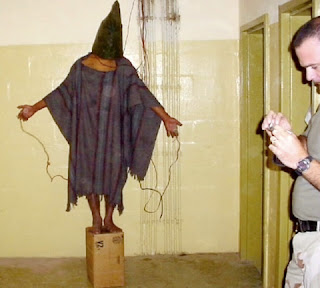The humor trail here is familiar: what starts out funny turns quite appalling. A condemnation of some of the hypocrisies of the religious police.
Friday, May 27, 2011
Friday, May 20, 2011
And then I'll shut up
It’s probably weird that the Arab world is going through a massive upheaval, Osama bin Laden is dead, and America has gone to war with Libya, and I haven't said anything. But honestly, I haven’t had much to say that hasn’t already been said in the millions of opinions floating around, so I’m listening – and trying to avoid reading about Bin Laden’s Porn Stash.
Randomly, on the night of Sept 10, 2001, I was reading this book:
Yes, I know, I know. I must have felt a great disturbance in the Force. Actually, it was published in 1999, 2 years before I picked it up, so I already felt I was coming late to the game when I opened it. From what I remember, Bodansky argues persuasively that OBL was a threat, and that Clinton-style responses to terrorism weren’t working, and it was only a matter of time before the big one struck. I fell asleep on the sofa with the radio alarm beside my head, and woke the next morning to voices – not the rock station I was used to hearing, but panic, a sense of emergency. I lay there and listened, and then jumped up in shock.
It's not hard to remember how this was a horrifically new kind of malice. We’d seen hijackers before so we knew about terrorism, and we had Pearl Harbor, but this was kamikaze terror on a whole new level, and it had happened in New York City.
It also introduced the idea that someone hated Americans enough to kill them indiscriminately. Or rather, that someone hated American ideology/government/foreign policy enough to start taking their rage out on ordinary people. (Back in the early days, nobody knew which.)
Sorry, it was time for a bunny.
Anyway, we were gobsmacked. Because normally, we’re that country that has to turn people away from our teeming shores because we know we’re awesome and everyone wants to live here. But we’re also that country whose citizens routinely travel abroad and claim they’re Canadian. Because everybody hates Americans and we know that, too. We just didn’t know they hated us THAT much.
If there’s one thing I’ve learned in the past decade, it’s that there isn’t much out there – not much that we have done – that has healed the pain from that event. War in Iraq? Afghanistan? Drone attacks on al-Qaeda? Sorry, still feeling shitty. Some of that war has been necessary in regards to al-Qaeda, but no war, no matter how necessary, is going to heal pain. It’s just going to (hopefully) get rid of the potential for more future pain – while attempting not to create too much of its own. A contradiction kept in uneasy balance.
 |
| Or not |
So the pain is still there. I don’t think about September 11 much, but when it does come up, it still has the power to make me cry. For example, just this week in the Economist:
 |
| World Trade Center |
The Idealist in me feels a missed opportunity now that Bin Laden is dead. I wanted to see him come around. Watch old age make him decide that porn was all right after all. An apology would have been nice, maybe a few regretful tears. Because you know that no matter how fervently you believe in something, there's always the potential to believe the opposite, and sometimes the more vehemently you believe..... (Sorry. Idealist.)
Realist: quit cryin' about stupid shit and start worrying about the next one.
 |
| Coming soon to an airplane near you |
Of all the things that have happened in the past ten years, the revolutions in Egypt and Tunisia have been the biggest slap in the face to al-Qaeda’s ideology of violent jihad. Although not bloodless, they were consciously non-violent. They’re a “screw that shit” to the fantasy of bringing back a religious caliphate. And every time someone demands a greater female presence in the fledgling Egyptian government, they are twisting the “take that, MF” knife in the chest of al-Qaeda and its fundamentalist corruptions of Islam. Yes, I just used violent imagery to explain non-violence. What can I say? Never lacking for tact.
Egypt, Tunisia, you are rocking the world. Every time you step forward, you’re not just healing your own countries, you’re helping heal some old pain over here, too. (Qaddafi, take a frickin lesson.)
Alaa Wardi - Maqool
Some beautiful music that also manages to be "instrumentless" (if you don't count using your whole body and then some computer mixing.) Not to mention the awesome-est use of a beard on all of YouTube.
And for another treat, check this out: a cover of Fi Hagat by Nancy Ajram.
And for another treat, check this out: a cover of Fi Hagat by Nancy Ajram.
Saturday, May 14, 2011
Danish Crime Fiction
I think it's a little weird that Sweden and Norway are making such a splash in crime fiction and Denmark is the quiet sister. But Denmark has plenty of its own writing greats, and a few of them are soon to be published in English, so you Scandinavian crime lovers out there, put these on your to-read list!
Jussi Adler-Olsen. Olsen writes a bestselling crime series - about inspector Carl Mørck in "Department Q" - that has been published to high acclaim in 25 countries. Earlier this year, six of his books were on the bestseller lists in Denmark. Only one book has been translated into English so far: Mercy (at Amazon UK), which will be published this year in America as The Keeper of Lost Causes.
Olsen won the prestigious Glass Key award in 2010.
Sara Blædel, aka the Danish Queen of Crime, is another hugely successful author with a crime series that's been published in numerous countries. Her six-book (and counting) series is set in Copenhagen and features Chief Inspector Louise Rick.
Her first American translation, Call Me Princess, will be published by Pegasus Books this August.
Elsebeth Egholm. Author of the popular 'Dicte Svendsen' series. Her first book in English, Next of Kin, tackles some meaty issues: interracial relationships and the tensions between a largely homogenous society and its ethnic minorities. From the description:
Fear and anxiety have spread to Denmark in the aftermath of the London bombings. Late one evening, journalist Dicte Svendsen receives an anonymous package containing footage of a brutal murder and beheading carried out by a sabre-wielding figure dressed in black.
Frustratingly, Egholm's English-language translations are only available in Australia at the moment, but you can protest by emailing any of the following publishers.
Jussi Adler-Olsen. Olsen writes a bestselling crime series - about inspector Carl Mørck in "Department Q" - that has been published to high acclaim in 25 countries. Earlier this year, six of his books were on the bestseller lists in Denmark. Only one book has been translated into English so far: Mercy (at Amazon UK), which will be published this year in America as The Keeper of Lost Causes.
Olsen won the prestigious Glass Key award in 2010.
Sara Blædel, aka the Danish Queen of Crime, is another hugely successful author with a crime series that's been published in numerous countries. Her six-book (and counting) series is set in Copenhagen and features Chief Inspector Louise Rick.
Her first American translation, Call Me Princess, will be published by Pegasus Books this August.
Elsebeth Egholm. Author of the popular 'Dicte Svendsen' series. Her first book in English, Next of Kin, tackles some meaty issues: interracial relationships and the tensions between a largely homogenous society and its ethnic minorities. From the description:
Fear and anxiety have spread to Denmark in the aftermath of the London bombings. Late one evening, journalist Dicte Svendsen receives an anonymous package containing footage of a brutal murder and beheading carried out by a sabre-wielding figure dressed in black.
Frustratingly, Egholm's English-language translations are only available in Australia at the moment, but you can protest by emailing any of the following publishers.
Christian Jungersen has one thriller in English and it looks amazing: The Exception. An "intense page-turner," according to Publisher's Weekly.
Iben, Malene and Camilla work in Copenhagen for the Danish Center for Information on Genocide. Even before Iben and Malene receive death threats with Nazi overtones, the three friends had been ostracizing the new librarian, Anne-Lise. Though evidence suggests Serbian war criminal Mirko Zigic has been sending the death threats, the paranoia and fear of the three friends converge to make Anne-Lise the target of rising suspicion. Victimizing is part of human nature, Anne-Lise's doctor tells her when she seeks advice, and the novel hauntingly pursues this idea to its deepest implications.
Subscribe to:
Comments (Atom)











